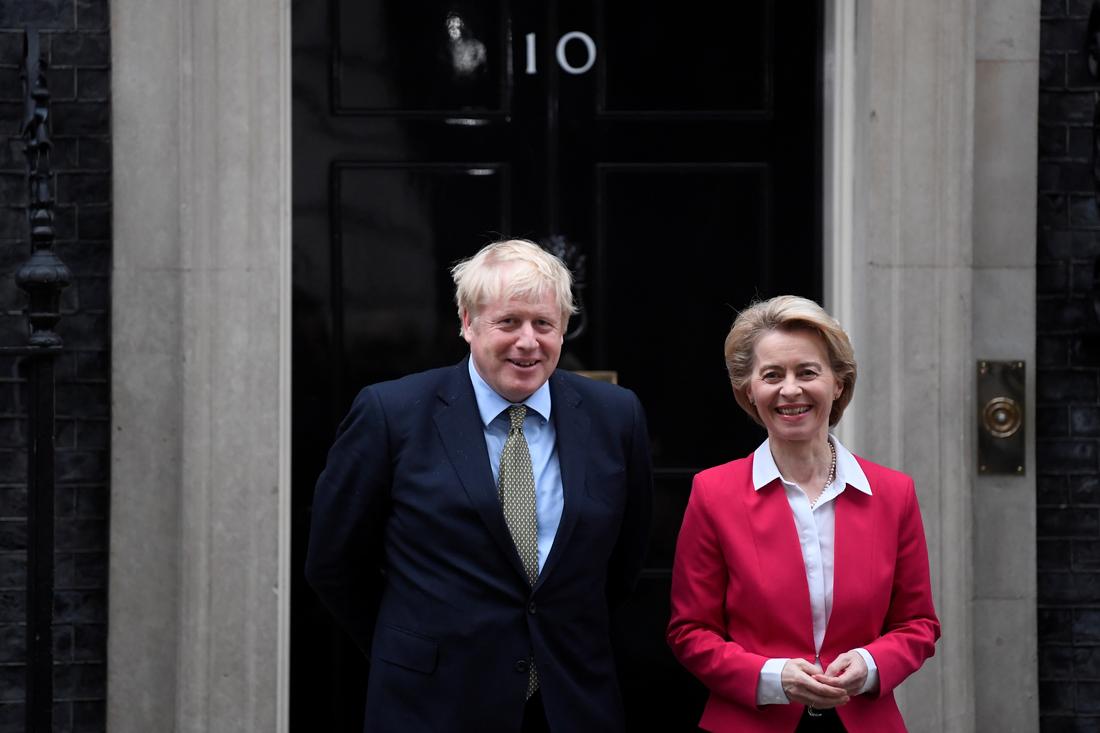Where do the EU-UK negotiations stand with just weeks until the Brexit deadline?

A few minutes every morning is all you need.
Stay up to date on the world's Headlines and Human Stories. It's fun, it's factual, it's fluff-free.
Negotiations have not always gone smoothly and with the official deadline fast approaching, a “no-deal Brexit” in which the UK no longer has any formal agreements with the 27 EU member states remains a possibility.
On January 1, 2021, after a referendum, two general elections and years of contentious debate, the United Kingdom will officially leave the European Union. It will bring to an end a political alliance between the island nation and mainland Europe that goes back nearly five decades. For some in the country, it will be cause for celebration, for others, grief.
Before “Brexit” (British exit) can officially occur though, the UK and the EU have to conclude their nearly year-long negotiations on economic trade deals and other political concerns. Negotiations have not always gone smoothly and with the official deadline fast approaching, a “no-deal Brexit” in which the UK no longer has any formal agreements with the 27 EU member states remains a possibility.
Here is where the Brexit negotiations stand mere weeks before the UK leaves the EU.
The state of Brexit negotiations
Following a 2019 general election in which the Conservative Party emerged victorious, Prime Minister Boris Johnson vowed to finalize Brexit and officially take the UK out of the EU. Succeeding where his successor had failed, Johnson delivered on his promise and the UK formally left the EU on January 31, 2020.
For pro-Brexit Britons, it was a moment of relief, but it merely marked the beginning of an 11-month transition period in which the two parties needed to negotiate their ongoing economic relations. Due to delays in formalizing the UK’s exit, which was initially meant to take place in March 2019, the 20-month transition period was cut in half, resulting in accelerated negotiations.
As of the first week of December, those negotiations, which have been taking place in Brussels, Belgium, the home of the EU’s headquarters, had yet to result in finalized trade deals. The BBC reported on December 7 that the trade talks were at a “critical stage,” with the EU and UK “still arguing over fishing rights and business competition rules.”
While “fishing rights” may seem a minor issue to be holding up these trade talks, they get to the heart of Brexit and the UK’s strained relationship with the EU.
The issue revolves around the EU wanting to maintain the rights to fish in waterways controlled by the UK. The UK does not want to permit the EU access to the water, as that is part of the nation’s sovereign territory. For many Britons, leaving the EU was largely about reclaiming the UK’s sovereignty and that extends to its waters.
However, if the UK refused to allow the EU use of its waters, the union, which is the largest trading bloc and collective economy in the world, could block access to its markets, therefore cutting off a substantial source of international trade for the UK.
Though an agreement on fishing rights appears likely, another sticking point remains: the UK’s adherence to the “level playing field” rules. These rules, agreed to by all EU member states, ensure equal environmental and business standards, so one country cannot take advantage by lowering their standards and undercutting competitors.
This, again, relates to a commonly cited reason among Britons for leaving the EU: they no longer wanted to be subjected to the regulations of a foreign governing body. However, France and Germany, the EU’s most influential members, have insisted that Michel Barnier, the EU’s chief negotiator, push this issue and demand the UK agree to maintain the EU standards.
Known as the “ratchet clause,” this critical point of negotiation seeks to solidify mutual raised environmental and labor standards. So, for instance, if the EU raises its environmental standards in the future, which would result in greater costs for its businesses, the UK could not take advantage of the situation by not raising its standards and thereby undercutting the EU.
Additionally, if both parties raise their standards in the future, they could not then “ratchet” them back down.
The two parties have already agreed to a “non-regression” pact which ensures that neither the UK nor the EU can reduce their existing standards after Brexit. However, as governments increasingly move to achieve higher environmental and labor standards, partly to combat climate change, the worry is one country would intentionally withstand higher standards for a temporary economic benefit.
Is the Irish border still an issue?
At one point, one of the biggest issues causing a delay in Brexit was the matter of the border between Northern Ireland and the Republic of Ireland (generally referred to simply as Ireland). While Northern Ireland is one of the four nations of the United Kingdom – along with England, Scotland and Wales – Ireland is an independent nation.
For many decades, the border between the two Irelands was guarded by British forces. During a period known as “the Troubles,” those seeking complete Irish independence from England were involved in violent clashes and attacks with British soldiers, especially at the Irish border. Hundreds were killed or injured throughout both Ireland and the UK.
In 1998, the Belfast Agreement, or the “Good Friday Agreement,” brokered peace between the two nations. As part of the agreement, the border between Ireland and Northern Ireland was opened up, with Britain’s military presence removed, allowing for unrestricted passage.
With the UK leaving the EU but Ireland remaining, one major concern that arose during Brexit talks was the necessity of reinstating a hard border between the Irish nations. It was feared this could result in a reemergence of violent tensions between Ireland and the UK. On the other hand, without a hard border between the nations, the UK could not control immigration or the passage of goods from the EU.
In February, PM Johnson announced a temporary solution to the problem: Northern Ireland and Ireland would maintain an open border for four years starting January 1, 2021. After four years, Northern Ireland would then vote on whether to remain in the EU’s trade bloc or fully join the UK.
However, in September, Johnson stirred up outrage when he proposed legislation, the Internal Market Bill, which could override the deal signed in January. Johnson took issue with what he claimed was the EU’s intention to create a trade border in the Irish Sea between Northern Ireland and mainland Britain (England, Scotland and Wales).
Johnson’s proposed legislation threatened a breakdown of negotiations, leading to the possibility of a no-deal Brexit, which, along with leaving no trade deals between the UK and EU, would likely result in a hard border between Ireland and Northern Ireland.
Johnson’s proposal, which would break international law, was met with anger throughout the UK, with the House of Lords overwhelmingly voting to remove the clauses relating to the Irish trade border. Additionally, United States President-elect Joe Biden told Johnson in a phone call on November 10 that he did not support the British prime minister’s Brexit agenda.
Johnson’s government has since stepped back from his hard-line stance, saying it would be willing to drop his proposed clause. However, negotiations between the UK and EU are still tense and Johnson is expected to meet with the president of the European Commission, Ursula von der Leyen, in Brussels.
Will there be a no-deal Brexit?
With Johnson showing a willingness to blow up deals that have already been made and plenty still to be agreed to in negotiations, the possibility of a no-deal Brexit remains a possibility.
After Barnier, the EU negotiator, said as much on December 7, the British Pound lost value. Furthermore, if no deal is reached, economists fear it could set off an economic crisis that could ripple out from the UK. There would be no set agreement on tariffs, tourism, or business travel, casting uncertainty through essentially every industry.
With the UK currently facing a second surge of COVID-19 cases and a return to lockdown for many of its citizens, the economy has already taken a serious hit in 2020. The economic consequences of a complete breakdown in international trade, no matter how temporary, would only exacerbate matters.
Other concerns for British citizens would be the more limited availability of medicines and a variety of goods that come from Europe, as well as disruptions in cross-border data exchanges and security matters that rely on international cooperation.
Have a tip or story? Get in touch with our reporters at tips@themilsource.com




Comments ()